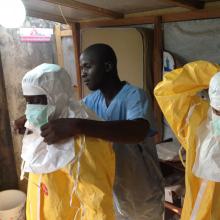west africa
Contemporary History
The duo Ibeyi are Naomi and Lisa-Kaindé Díaz, 19-year-old French-Cuban twins with Yoruba roots—a West African culture transplanted to Cuba during slavery. Ibeyi’s self-titled album begins and ends in prayer; in between is a fusion of English and Yoruba, minimalist piano and percussion, jazz and hip hop. XL Recordings
“Administration officials have repeatedly assured Americans that they were prepared for Ebola. Less than two weeks ago here at the White House, they insisted they knew how to stop this virus in its tracks. But so far, the virus appears to be outrunning the government. “
So began Scott Horsley’s report from the White House, one of three separate stories NPR’s news showAll Things Considered devoted to Ebola on Wednesday, October 16. According to yet another report, a recent Harvard School of Public Health survey finds that 40 percent of Americans feel “at risk” of contracting the disease.
We have Ebola on the brain.
Several of my friends expressed alarm when the first Ebola patient flew to the United States for treatment. Now we find that not one but two Dallas nurses have contracted Ebola, likely because their hospital did not adopt proper Ebola protocols. Americans know that their medical system is far better equipped to prevent an Ebola outbreak than are those in West Africa. We know our system is better prepared to offer effective treatment. But the appearance of multiple cases, one involving a nurse who took a commercial flight while possibly contagious, has people concerned. When a key public health expert says, “It’s a learning process, and . . . our confidence in the hospitals was ill-founded,” the rest of us might get a little nervous.
In the past few months, the world has witnessed the worst outbreak of Ebola since the disease was first identified in 1976 — it has already claimed the lives of more than 3,400 people. But while the first cases in the U.S. and Spain have stirred fears over the past week, we don’t need to fear an unstoppable epidemic in developed countries. As World Bank President Jim Yong Kim aptly put it in a piece for the Huffington Post:
The knowledge and infrastructure to treat the sick and contain the virus exists in high- and middle-income counties. However, over many years, we have failed to make these things accessible to low-income people in Guinea, Liberia, and Sierra Leone. So now thousands of people in these countries are dying because, in the lottery of birth, they were born in the wrong place.
Dr. Kim makes the crucial point here — the current Ebola outbreak is much more than a public health crisis — it is an inequality crisis.
The headlines and talk shows are dominated by the response ISIS. To be clear, this group readily uses fanatical and brutal actions to achieve its radically exclusive vision. The images they skillfully project are like violent, X-rated video games made real. No wonder that many react to this horror with chills going down their spines. But there is something that worries me more: the ongoing Ebola crisis.
How did ISIS come about? Sure, there’s huge complexity. Yet, we know that ISIS never would have emerged without, first of all, the U.S. invasion of Iraq and the ensuing, devastating war that left that nation in physical, political, and psychological shambles. Second, the sectarian, Shia-dominated regime, which emerged as the final U.S. ground troops left, further radicalized Sunni extremists. These factors were the breeding grounds for black-clothed fanatics ready to cut down any who differ with their identity, even if the majority of its victims are Muslims.
ISIS’s greatest recruiting tool is continued and renewed U.S. and Western military intervention in the Middle East. That, of course, is what their brutal actions are attempting to provoke. The moral callousness of this strategy inspires the fear which they desire and welcome.
However, ISIS can and will be contained. The neighboring regimes in the region are all deeply threatened by ISIS. In the end, they will be compelled to combat and resist ISIS the more these fanatics move out of the desert and toward others’ homelands. It will be bloody, but eventually other nation states and threatened sectarian groups, representing for the most part more mainstream and globally dominant expressions of Islam, will contain and defeat ISIS. The necessity and means of outside military assistance from the West and elsewhere is highly debatable, and at the end of the day, I don’t believe this will be the decisive factor.
As Western nations evacuate their citizens from West Africa’s growing Ebola outbreak, some Christian leaders have begun to speak of the virus as a curse from God.
On Friday, the World Health Organization declared the Ebola crisis ravaging the region an international health emergency. On the same day, Nigeria became the latest country in West Africa to declare the virus crisis a national emergency, the day after Spain evacuated a priest and a nun from Liberia to Madrid.
On Saturday, a Congolese nun died from Ebola in Monrovia, the capital of Liberia, the AP reported.
The outbreak started in December in Guinea, but was not discovered until March. It has since killed more than 1,000 people in Liberia, Guinea, and Sierra Leone.
“People are having different misconceptions that this is [a curse] from God,” said Bishop Sumoward Harris, now retired from the Lutheran Church in Liberia. “This is depending on how they are interpreting the Bible. But I don’t think God is angry and is issuing a punishment.”
In Liberia, more than 100 Christian leaders meeting in early August declared that God was angry and Ebola a plague.





